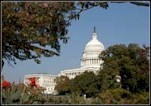
MENU
. . . . . . . . .
Quick Finder
. . . . . . . . .
|
NEIGHBORHOOD STABILIZATION ACT OF 2008 HON. BARNEY FRANK OF MASSACHUSETTS IN THE HOUSE OF REPRESENTATIVES May 7, 2008
Mr. FRANK of Massachusetts. A former President once unfairly characterized a leader of this House as someone who couldn't walk and chew gum at the same time. The gentlewoman from West Virginia extends, frankly, that insult to the whole House. She suggests we can't do two bills in one night. She says we should work to try to help avoid foreclosure. I agree. That's the next bill which we will get to after all of this useless temper tantrum is over, we will get to it at 3 o'clock in the morning, but we will get to it. That bill will help avoid foreclosure. I know the gentlewoman agrees. She voted for that bill in committee although a majority of her colleagues were against it. But I do not understand how anybody could argue that doing this bill now interferes with that bill later. They are totally not in conflict. So the notion that this bill doesn't keep people out of foreclosure is true. It doesn't combat global warming. It doesn't get troops out of Iraq. It won't help me lose weight. There are a lot of things this bill won't do that I very much want to do. None of them are a reason to vote against a bill that doesn't do what it doesn't say it's going to do but does what it does. What it does is to go to the aid of cities that have been victimized by the deregulation run rampant, perpetrated by this administration, which has led to the subprime crisis. We have vacant property everywhere in these areas. Now the argument that this is going to award speculators and be an incentive to do foreclosures is also flatly wrong. This is $15 billion. People will tell you it's a lot of money, and it is. Do you know how much money this is? This is half of the money that this administration made available to buy up the debts of Bear Stearns. Now, I think they had to do that. I think they were forced to do it. But I think we have to do this as well. I do think that the whole country, under this administration's calculation, ought to get at least half of what Bear Stearns got. That's all that this does. Now, unfortunately, it's not nearly enough to buy up the property that's foreclosed. So anyone who says, I'm going to foreclose today because I want to get in on this, would be nuts because there is already property ahead of them. And even when this bill becomes law, if it does, there's a 60-day wait, and I hope it will be part of the stimulus. Property that was once paying taxes because of this subprime crisis now eats taxes. It bites neighborhoods . And, yes, some of the people who foreclose may benefit here. But we are telling the cities and the States to be careful with this money. They have to buy it for affordable housing. That will put limits on what they will pay. And you can say, well, why don't the cities do it on their own? Because the very cities that need help here have lost revenue because of this foreclosure. These properties are fire traps; they attract people who break the law; they attract sanitary nuisances. They lead to water hazards. The Acting CHAIRMAN (Ms. Baldwin). The gentleman's time has expired. Ms. WATERS. I yield an additional minute to the gentleman. Mr. FRANK of Massachusetts. I always feel good when people make arguments against legislation that won't really deal with the legislation. The notion that the problem with this bill is that it doesn't help avoid foreclosure, when it was not the bill intended to avoid foreclosure, shows well, there's a dearth of arguments against it. The argument that it's going to reward the speculators, this will go to cities dealing with property that is causing them problems. Do we not trust the cities and States of this country to take this money and use it judiciously and wisely to prevent neighborhood decay? I don't understand the animus that motivates so many of my Republican colleagues that say, Oh, no, let's not have government intervention here. Well, we heard that a while ago, and people on the other side successfully blocked government intervention in regulating subprime mortgage origination outside of the banks. It was this religion of never intervening that brought us here. A limited intervention to undo the negative consequences is what this bill calls for. END
|
|
Search on Thomas |
|| Issues || Biography
|| Constituent Services || Contact
||
|| Legislative Info || Today
in Congress || Links
